Scuba diving opens a gateway to a mesmerizing underwater world, where divers encounter vibrant marine life and stunning ecosystems. With the right training and equipment, you can explore everything from tranquil coral gardens to challenging wreck sites. It’s not just an adventure; it’s also a chance to promote environmental stewardship and conservation efforts. As novices and experienced divers alike prepare for their next dive, they often wonder which locations offer the most breathtaking experiences and what essential gear they’ll need. The journey into this captivating realm has just begun, and there’s much more to consider.
Key Points
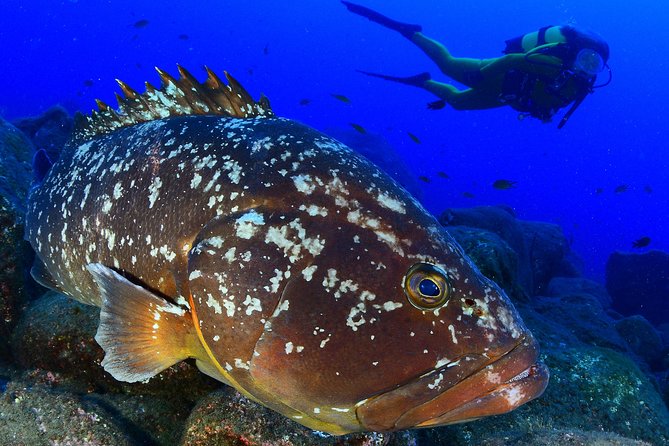
- Scuba diving is an underwater exploration activity that requires a self-contained breathing apparatus (SCBA) for breathing and maneuverability.
- Certification is often necessary, ensuring divers are trained in essential safety protocols and skills.
- Popular diving locations include Ponta Delgada in the Azores, known for its crystal-clear waters and rich marine biodiversity.
- Essential diving equipment includes wetsuits, masks, fins, buoyancy control devices, and dive computers for safety and comfort.
- Responsible diving practices include avoiding contact with marine life, using eco-friendly products, and participating in local conservation efforts.
What Is Scuba Diving?
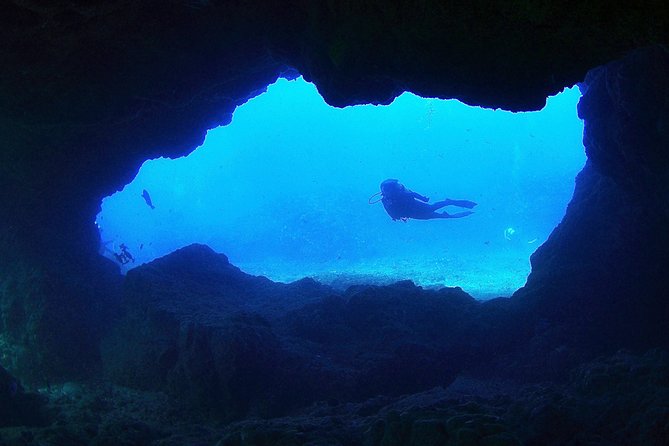
Scuba diving is an underwater exploration activity that allows individuals to experience the beauty of marine life while using self-contained breathing apparatus. This thrilling sport combines adventure with the opportunity to observe vibrant ecosystems, including colorful corals and diverse fish species.
Divers wear specialized gear designed for safety and comfort, enabling them to breathe underwater and maneuver freely. Certification is often required for divers, ensuring they’re trained in essential skills and safety protocols.
Scuba diving appeals to adventurers of all levels, from beginners to seasoned pros. It encourages environmental awareness and appreciation for underwater habitats, fostering a connection with nature.
With proper training and respect for the marine environment, divers can enjoy unforgettable experiences beneath the waves.
You can also read our reviews of more tours and experiences in Ponta Delgada.
Best Locations for Diving
Crystal-clear waters, vibrant marine life, and diverse underwater landscapes make Ponta Delgada in the Azores a top choice for diving enthusiasts. This stunning location offers numerous dive sites, each showcasing unique features and experiences.
Here are three must-visit spots:
-
Vila Franca do Campo: Known for its underwater volcanic formations and diverse species, it’s ideal for both beginners and experienced divers.
-
The Blue Hole: A thrilling dive with deep walls and colorful fish, perfect for those seeking adventure and beauty.
-
Boca do Inferno: This dramatic site offers breathtaking underwater caves and an abundance of marine life, captivating divers of all skill levels.
With its rich biodiversity and stunning scenery, Ponta Delgada promises unforgettable diving experiences.
Equipment Needed for Diving
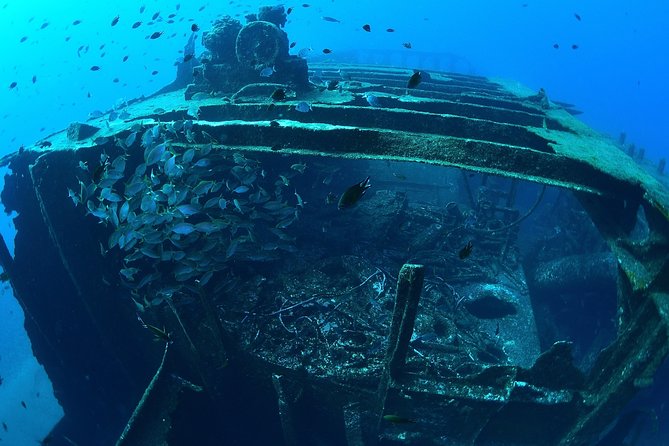
Before heading to the stunning dive sites of Ponta Delgada, divers should make sure they’ve the right equipment to ensure a safe and enjoyable experience underwater.
Essential gear includes a wetsuit or drysuit for thermal protection, a mask and snorkel for clear vision and breathing, and fins for efficient movement.
A buoyancy control device (BCD) helps manage flotation, while a regulator provides breathable air from the tank.
Divers must also carry a tank filled with compressed air and a depth gauge to monitor their dive.
Plus, a dive computer is invaluable for tracking time and depth, while a safety kit, including a whistle and surface marker buoy, enhances safety.
With the right equipment, divers can fully enjoy the underwater wonders of Ponta Delgada.
Health and Safety Guidelines
Ensuring a safe diving experience in Ponta Delgada requires adherence to specific health and safety guidelines that all participants must follow. These guidelines help protect divers and enhance their overall experience in the beautiful underwater environment.
-
Certification and Health: Divers must provide evidence of their dive certification and complete a health questionnaire before diving.
-
Physical Fitness: A moderate fitness level is essential, and individuals with serious medical conditions, like heart problems, should refrain from diving.
-
Timing: Divers should avoid diving within 48 hours of flying to prevent decompression sickness.
Dive Tours in Ponta Delgada
Participants can explore the stunning underwater world of Ponta Delgada through a variety of exciting dive tours tailored for certified divers. These tours offer an opportunity to discover the vibrant marine life and unique underwater landscapes of the Azores.
Guided by experienced professionals, divers can embark on two daily departures, ensuring flexibility for their schedules. Each tour includes essential amenities, such as equipment storage and hotel pickup options.
The dive sites feature crystal-clear waters, teeming with colorful fish and fascinating rock formations. With prices starting at €55.00, participants can enjoy an unforgettable experience while adhering to health and safety guidelines.
Ponta Delgada’s dive tours promise adventure and unforgettable memories for all who dare to explore its depths.
User Experiences and Reviews
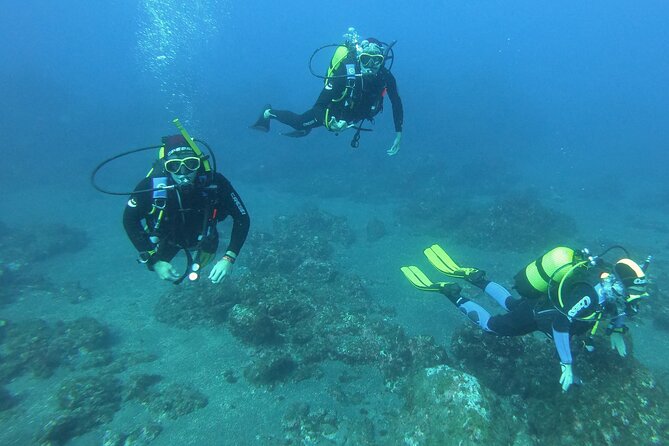
Diving enthusiasts rave about their experiences in Ponta Delgada, highlighting the exceptional guidance from dive masters and the comfort provided for beginners. Visitors consistently commend the professionalism and knowledge of the dive masters, ensuring everyone feels secure underwater.
Key points from user reviews include:
-
Personalized Attention: Divers appreciate the individualized support, especially first-timers who feel at ease.
-
Flexible Pricing: Discounts are often offered due to weather-related visibility issues, making dives more accessible.
-
Inclusive Experience: The tours cater to various skill levels, making it a perfect choice for both beginners and seasoned divers.
Tips for First-Time Divers
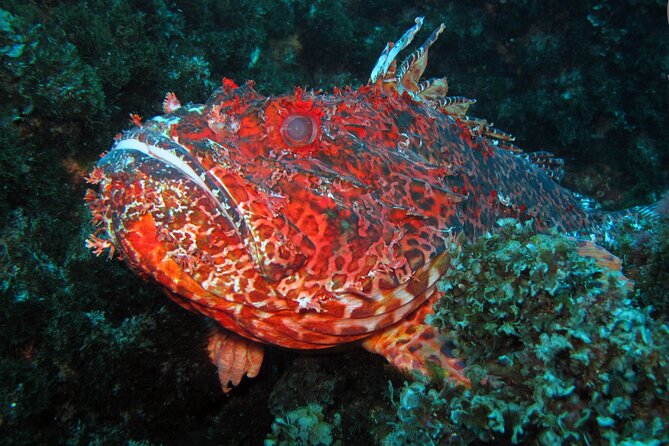
For first-time divers, preparing thoroughly before the adventure can significantly enhance their experience and confidence underwater. Here are some essential tips to remember:
| Tip | Description | Why It’s Important |
|---|---|---|
| Get Certified | Complete a diving course with a reputable school | Safety and skill development |
| Practice Breathing | Focus on slow, deep breaths during dives | Helps manage anxiety and conserve air |
| Listen to Your Guide | Pay attention to instructions and safety briefings | Ensures safety and a better experience |
| Stay Relaxed | Keep calm and enjoy the underwater scenery | Reduces stress and enhances enjoyment |
Environmental Awareness in Diving
Understanding the importance of environmental awareness is crucial for divers who seek to explore and protect the underwater ecosystems they encounter. By adopting responsible diving practices, divers can minimize their impact on marine life and habitats. They must remember that every action counts.
-
Avoid touching marine life: Contact can harm delicate organisms and disrupt their natural behaviors.
-
Use eco-friendly sunscreen: Many sunscreens contain chemicals harmful to coral reefs; opting for reef-safe products helps protect these vital ecosystems.
-
Participate in clean-up initiatives: Engaging in local conservation efforts fosters a sense of community and actively contributes to ocean health.
Frequently Asked Questions
What Should I Wear While Scuba Diving?
When considering suitable attire for underwater activities, one should opt for a wetsuit or drysuit, depending on water temperature. Proper footwear, gloves, and a mask are essential for comfort and protection during the experience.
How Deep Can I Dive as a Beginner?
As a beginner, they can typically dive up to 12 meters (40 feet) under supervision. It’s essential they follow guidelines, prioritize safety, and gradually increase depth with experience and training for a rewarding underwater adventure.
Are There Age Restrictions for Scuba Diving?
There are generally no strict age restrictions for diving, but most operators require participants to be at least 10 or 12 years old. Parents should ensure minors are comfortable and capable of handling the experience.
Can I Scuba Dive if I Wear Glasses?
Many people wonder about wearing glasses during underwater activities. With appropriate prescription masks or contact lenses, you can comfortably enjoy their experience. It’s essential to consult with a professional for the best options available.
What Happens if I Have a Diving Emergency?
In a diving emergency, the guide’s trained to respond quickly. They’ll assess the situation, provide assistance, and ensure safety. Communication’s key, so participants should stay calm and relay any issues immediately to their instructor.
Recap
In summary, scuba diving opens up a world of underwater wonders, offering unforgettable experiences for everyone from beginners to seasoned explorers.
With stunning locations, essential gear, and a strong focus on safety and conservation, divers can truly enjoy the beauty of marine ecosystems.
By embracing environmental awareness, they not only enhance their own adventures but also contribute to the protection of these vital underwater habitats.
So, grab your gear and dive into this incredible journey!
More Tour Reviews in Ponta Delgada
Not for you? Here's more nearby things to do in Ponta Delgada we have reviewed
- Discover and Hike São Miguel Island with Guide
- Fire Lagoon, Waterfall Route and Furna Tour
- Canyoning & Furnas Tour (Azores – São Miguel)
- Sete Cidades on Jeep
- Jeep Tour – Lagoa do Fogo (Half day)
- Volcano of Sete Cidades Private Tour
- Pedestrian Walk Vista do Rei Sete Cidades(Half day)
- Private Tours Best spots (views) in So Miguel Island
- Private Transport from Ponta Delgada Joao Paulo II Airport to hotels
- Private Half-Day Tour in Furnas São Miguel Island
- Sete Cidades, Hike Serra Devassa and Boca do Inferno
- Lagoa do Fogo and Ribeira Grande Half Day Private Tour
